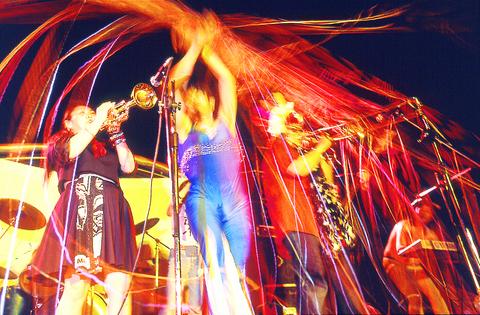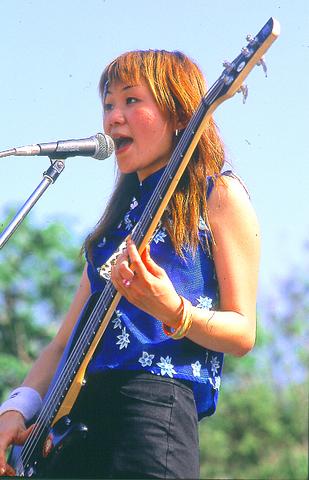Spring Scream or spring break? At least seven outdoor concerts, raves and parties will take place in Kenting next weekend, and for an 18-year-old Taipei girl like Tsai-ping, it presents a tough decision.
"I want to go to all of them," she said. "Since high school I've always wanted to go."

The parties of Kenting's Spring Weekend, the first weekend in April, have become a beacon for Taiwanese youth. Police estimate that last year's events attracted between 2,000 and 3,000 young people. Event organizers put the total closer to 7,000 or 8,000. This year everyone agrees that it will be bigger.

PHOTO: ALBERTO BUZZOLA
With four major parties there will be a lot to choose from (see stories page 18). Next Saturday night will pit Japan's superstar DJ Takkyu Ishino against the million-CD-selling pop act Mayday (五月天), underground bands from New York, Japan and Hong Kong, and Taipei's top club DJs.
Rave promoter David Jr. has said he's "trying to give Taiwan its own Ibiza or Koh Phangan."
It's a demographic sponsors can't ignore. This year HBO, MTV, Sony Music and any number of beer and liquor brands have added their support for the first time. EMI Music will also scout the event, said one promoter. "Our target market is young people, especially young people at musical events," said Shawn Yue of Jardine Caldbeck, which markets Bacardi rum.
"[Kenting's Spring Weekend] is a famous event. We consider it a very good opportunity," she said.
The whole Kenting phenomenon rose out of a concert called Spring Scream, which this year will showcase more than 150 bands over four days.
"It started off as not much more than an overgrown birthday party, only it wasn't anyone's birthday," said Jimi Moe, one of Spring Scream's two expat organizers.
The first event of 1995 had about 300 people and a handful of bands. Moe's only prior experience was "out in the sugar cane fields [around Taichung] throwing parties in these gun turrets."
Since the beginning, Spring Scream has idealistically aimed to be cheap and democratic, showing as many bands as possible and, as co-organizer Wade Davis put it, "getting down to what music is really about." There are no sponsors, bands are unpaid and the staff consists of volunteers even now. The festival was essentially set up as an alternative event even though at the beginning there was no mainstream to react against.
Oddly, a mainstream has since grown up around it. Two years ago the weekend saw its first rave, and last year rave attendance beat out Spring Scream. David Jr. claims around 5,000 came to his Moonlight Party -- one of two raves held -- on last year's Saturday night alone, while Spring Scream claimed around 3,000 for the entire weekend.
Kenting's population is less than 1,800, so these partiers come from elsewhere, mostly big cities like Taipei, Kaohsiung and Taichung.
Mei Huang runs Maussac, a Taipei tea shop, and Jordan Chang manages a popular Kaohsiung pub, the Pig and Whistle. Both employ college age workers and share the same complaint. "All our employees want to go to Kenting, but if they do, there won't be anyone left here to work," said Huang.
For students like Tsai-ping, the pilgrimage is neither quick nor cheap.
Spring Scream costs NT$1,200. So does a party called Love Mansion, for which a Taipei nightclub has rented out an entire 67-room hotel. The Moonlight Make a Wish Party costs NT$2,000 for three days or NT$800 per night, and MTV's nightclub party costs NT$400 a night. On top of that there are hotel rooms and tickets for the eight hour bus ride from Taipei."We've been saving money for two months and I'm still not sure if it's enough, but I'll probably go anyway," Tsai-ping said.
If she does, decisions will be complicated further by an incestuous mix of party plans. Bands Dog G (大志), Mimie Chan and We Save Strawberries (草莓救星) are playing at two parties each as is DJ K-Fancy, while Chang Chen-yue (張振嶽) will play rock at one party and DJ at another.
Promotions for advanced ticket sales -- including incentive packages with bus tickets and other perks -- are fiercely competitive in Taipei. As part of the battle, raver and rocker factions have been smearing each other daily in Internet chat rooms with rumors and simple insults.
"It's really intense this year, but that's because the event is getting bigger," said David Jr.
But party promoters will not be the only ones to cash in. For Kenting locals, the Spring Weekend is the busiest of the year, with some business owners claiming to take in between 5 percent and 10 percent of their annual earnings over the four-day stretch. "I can earn as much as I normally do in a month's worth of summer weekends," said Chen An-ping (陳安平), who runs a Kenting restaurant.
Lee Ching-shen (
One Kenting hotel owner said that many small hotels intentionally leave rooms unbooked during the weekend's seller's market, so they can gouge customers for maximum profit.
Almost two weeks before the event Lee said, "I'm getting 10 calls a day asking for reservations, sometimes even at 3am. It's hard work doing an honest trade."
T-shirt shop-owner Vincent Liu (劉協達) put it simply: "Spring Scream is the peak."
Even though Liu knows that Spring Scream is only one of several parties, he still refers to the weekend by that name. So do nearly all Kenting locals as well as the national media, who refer to it as Chun Tien Na Han (春天吶喊). Going a step further, college kids have abbreviated it to Chun Na (春吶) in Web chat sites and campus magazines, a measure of the event's widespread recognition.
"It's funny how the whole weekend has come to be called Spring Scream," said event organizer Davis. The result has been confusion on the part of local residents, government officials and media over which parties are doing what. Distinguishing between the events has become a matter of some importance after one rave-goer drowned and 110 more were busted for drugs last year.
"People here should be grateful to Jimi [Moe] and Wade [Davis]," said Liu. "They've brought a lot of business and their concert doesn't make any trouble, but most people here don't really know that."
A few locals are unhappy with the partying. Scuba instructor Steven Lin (林永文) said, "We hate it. Kids bring in drugs, there are traffic accidents and this stretch of highway turns into a drag race. If it was just Spring Scream, if it was just bands, I think it would be okay. But that electronic music ...," he nods his head disapprovingly.
The majority of Kenting residents, however, aren't put off. One shop owner, surnamed Kao, remarked: "Those bad things are unfortunate, but it's a very happy time."
Even if the noise and drunk college kids pose a few problems, for most Kenting businesses, tourist dollars are the bottom line. As one old hotel owner said, "Those are small matters, you know. Because we can get lots of customers!"

Aug. 4 to Aug. 10 When Coca-Cola finally pushed its way into Taiwan’s market in 1968, it allegedly vowed to wipe out its major domestic rival Hey Song within five years. But Hey Song, which began as a manual operation in a family cow shed in 1925, had proven its resilience, surviving numerous setbacks — including the loss of autonomy and nearly all its assets due to the Japanese colonial government’s wartime economic policy. By the 1960s, Hey Song had risen to the top of Taiwan’s beverage industry. This success was driven not only by president Chang Wen-chi’s

Last week, on the heels of the recall election that turned out so badly for Taiwan, came the news that US President Donald Trump had blocked the transit of President William Lai (賴清德) through the US on his way to Latin America. A few days later the international media reported that in June a scheduled visit by Minister of National Defense Wellington Koo (顧立雄) for high level meetings was canceled by the US after China’s President Xi Jinping (習近平) asked Trump to curb US engagement with Taiwan during a June phone call. The cancellation of Lai’s transit was a gaudy

From Godzilla’s fiery atomic breath to post-apocalyptic anime and harrowing depictions of radiation sickness, the influence of the nuclear bombings of Hiroshima and Nagasaki runs deep in Japanese popular culture. In the 80 years since the World War II attacks, stories of destruction and mutation have been fused with fears around natural disasters and, more recently, the Fukushima crisis. Classic manga and anime series Astro Boy is called “Mighty Atom” in Japanese, while city-leveling explosions loom large in other titles such as Akira, Neon Genesis Evangelion and Attack on Titan. “Living through tremendous pain” and overcoming trauma is a recurrent theme in Japan’s

As last month dawned, the Democratic Progressive Party (DPP) was in a good position. The recall campaigns had strong momentum, polling showed many Chinese Nationalist Party (KMT) lawmakers at risk of recall and even the KMT was bracing for losing seats while facing a tsunami of voter fraud investigations. Polling pointed to some of the recalls being a lock for victory. Though in most districts the majority was against recalling their lawmaker, among voters “definitely” planning to vote, there were double-digit margins in favor of recall in at least five districts, with three districts near or above 20 percent in